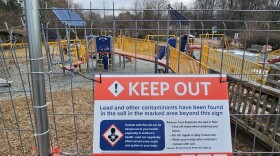Many farms spread human waste on cropland to fertilize it. In this case, the waste is called "biosolids". It can carry household chemicals that affect important bacteria, and that can hurt soil health.
The government has had a hard time regulating chemicals in biosolids, because the equipment that measured bacterial gases was very expensive.
But a new report from Duke University's school of engineering shows that bacterial reactions to chemicals can be assessed by changes in color. That's a cheaper test to administer.
Co-authors Claudia Gunsch and Ryan Holzem used a color spectrum to measure how these bacteria reacted to contamination by antimicrobial chemicals: The kind used in hand sanitizer and toothpaste.
“This method can now be applied to any contaminant that is being produced and incorporated into any type of consumer product that might end up in sewage, so, in waste water,” Gunsch said.
Gunsch says this method is valuable to both chemical companies as well as federal regulators.








